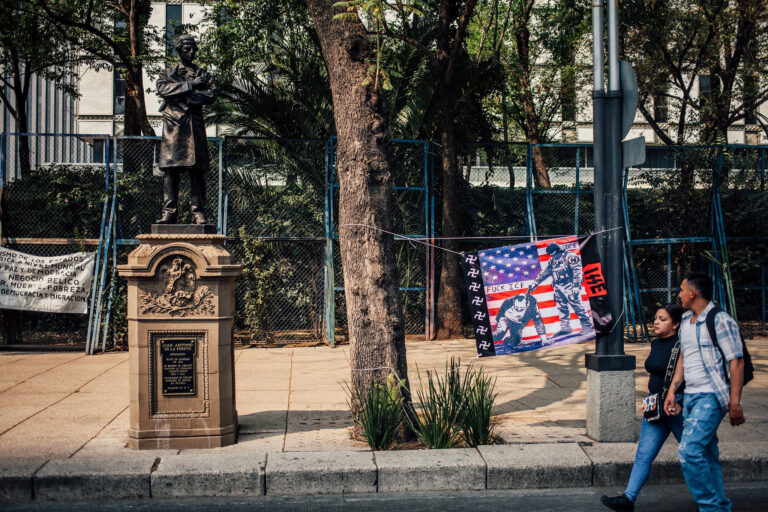Airbnb-linked Fund Behind Mexico’s Rental Monopoly
This article by Dora Villaneuva first appeared in the July 7, 2025 edition of La Jornada, Mexico’s premier leftist daily newspaper.
Beyond its marketing, which aims to reduce the displacement and financialization of housing for hosts and guests, Airbnb is the biggest springboard for Blueground—a U.S. company that controls nearly 900,000 square meters of real estate assets around the world and is financed by foreign investment funds—to become the leading provider of rental housing in Mexico City.
With 242 properties—houses and apartments—for rent in the Mexican capital, Blueground has established itself as the leader of a group of Airbnb hosts, which in no way fit the narrative of the collaborative economy or short-stay tourist accommodations.
Beyond being a service between intermediaries, Airbnb and Blueground share the fact that they were backed by the same investment fund: WestCap, based in New York, led by Laurence A. Tosi, former CFO of Airbnb.
Through the latter, Blueground now finds itself at the forefront of an amalgam of intermediaries that control so many properties in Mexico City’s most serviced neighborhoods—and which have been built for years with Mexican taxpayer money—that they can set prices for a predominantly foreign market.
Inside Airbnb—a platform that documents Airbnb data in some cities around the world—reports that Blueground is the most prominent case, but these real estate agencies also include Mr. W, with 192 houses and apartments for rent; HOMi, with 109; Host Me Tender, with 95; and Capitalia, with 142.
Data updated as of March 19 comes directly from Airbnb and shows that the neighborhoods of Condesa, Hipódromo Condesa, Roma, Juárez, Chapultepec, and Nuevo Polanco—which are leading the rise in rents in Mexico City —contain the largest number of homes managed by these intermediaries.
As part of a campaign to counteract its regulation in the Mexican capital, the platform highlighted that the host community in Mexico City is primarily made up of people who share their own living spaces. Three out of four hosts offer only one accommodation, while more than 10 percent offer only two spaces.
However, data from Inside Airbnb shows that in Mexico City, 65.8 percent of hosts rent entire homes and rooms, not private or shared rooms. And while 8,820 of the 26,047 hosts only list one room or property, 7,298 list more than 10.
Hosts with multiple listings are more likely to be running a business, not living on the property, and violating most short-term rental laws designed to protect residential properties, Inside Airbnb notes.
On July 1, La Jornada asked Airbnb how many of its hosts are legal entities and how many are individuals. It also—before identifying the potential conflict of interest posed by WestCap—inquired whether the platform has any limit on the number of accommodations a host can list and the price at which they can bid, in order to rule out possible cartel-like conduct. To date, there has been no response.
According to a statement from Blueground itself regarding its $180 million fundraising effort through WestCap, the fund has made notable investments in technology businesses such as Airbnb, StubHub, Klarna, iPreo, Skillz, Sonder, Addepar, Hopper, iCapital, and Bolt.
The Mexican capital is the only city where Inside Airbnb collects the company’s data, and where it’s easy to see that Blueground concentrates its real estate market in the most serviced areas of Mexico City. However, the company also operates in the Baja California Sur and Yucatán peninsulas; in Guanajuato, Monterrey, and Guadalajara; as well as in Mazatlán, Acapulco, and the coasts of Jalisco and Nayarit.
A central point of the debate over regulating Airbnb in Mexico City is setting a limit on the number of days a home can be rented: no more than 182 nights per year. The platform filed an appeal, arguing that this restriction of 50 percent of nights per year was developed and approved without taking everyone’s opinion into account and with the intention of providing supposed certainty to the hotel industry without considering the impact it would have on Mexico City hosts and their families.
Blueground, the largest housing provider in Mexico City through Airbnb and the world’s largest global rental platform for furnished apartments for medium- and long-term stays, works with periods of at least 30 days. Part of its business involves signing contracts with owners, guaranteeing them a fixed monthly income regardless of whether the property is rented or not.
Blueground offers flexible furnished apartments in 40 cities around the world, which are its core business, although it operates in more. In Mexico City, it offers spaces ranging from 33 square meters for 25,910 pesos per month to 207,139 pesos for a three-bedroom apartment. The platform emphasizes that its business is far from short-stay options: Stay longer, save more.
-
CNTE Announces 72 Hour National Strike & March to Mexico City’s Zócalo
The class-conscious teachers union will also make “courtesy visits” to the embassies of countries who committed atrocities against Iran, to show their rejection of US imperialism.
-
Yet Another Mexican Citizen Dies in ICE Custody
The unidentified victim is the 9th Mexican citizen to have been killed in ICE detention since the beginning of 2025; this time in Adelanto, California.
-
Let’s Talk About Migration: Trumpist Persection
Millions of women who have endured unspeakable violence on their migration journey are now being persecuted in the United States by an extremely xenophobic and misogynistic government, led by Donald Trump,




